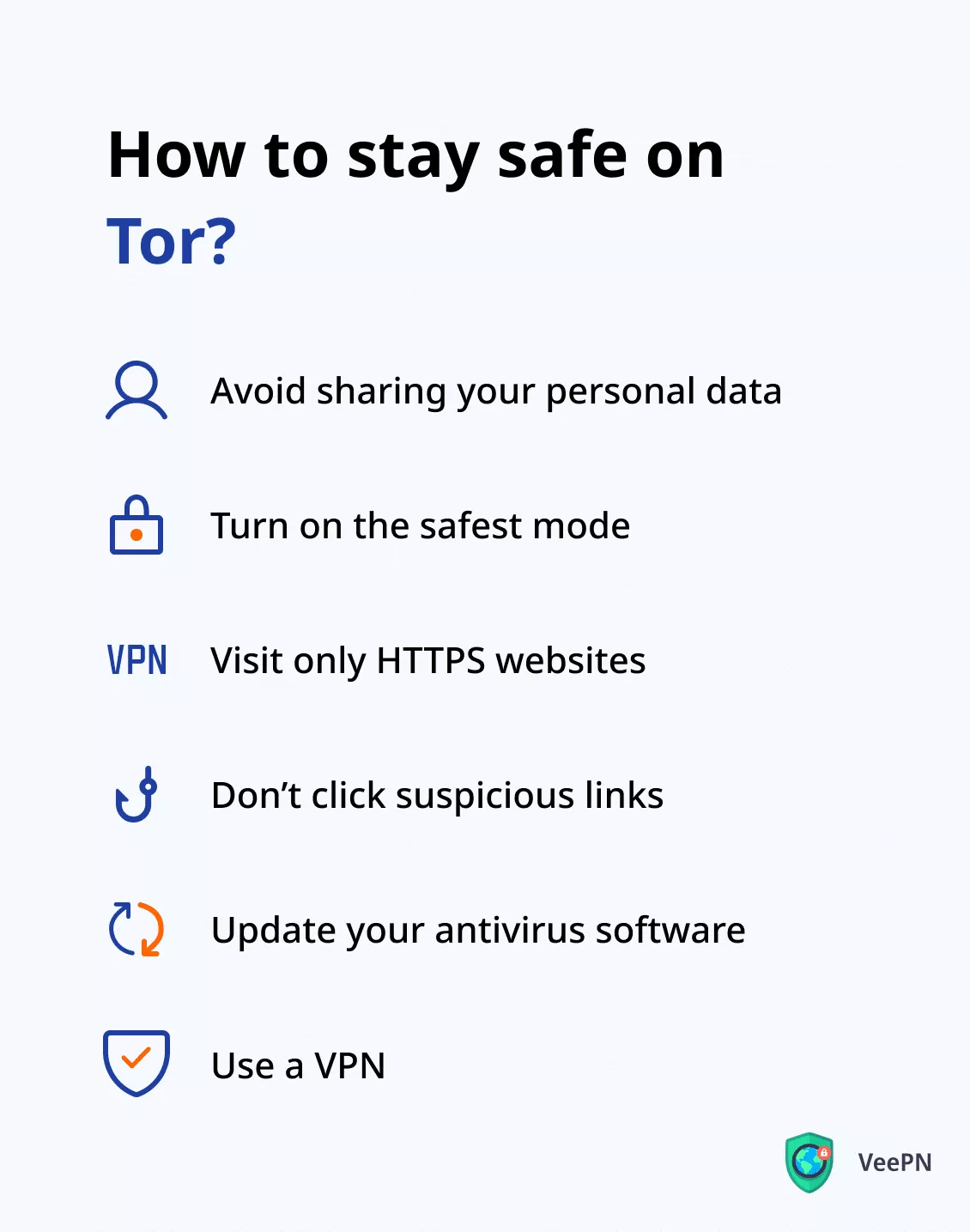Is Tor Safe? 5 Things You Should Know Before Using It
When it comes to online privacy, many people turn to Tor as a tool for safe and anonymous browsing. But how safe is it really? Is Tor Browser safe enough to protect you from prying eyes, or are there risks users should be aware of? Tor was designed to provide secure, private access to the internet by routing your traffic through multiple servers, making it harder to track. While this can be effective in many cases, it’s not foolproof. In this article, we’ll answer the question Is Tor safe?, explore how Tor works, its strengths, and the potential vulnerabilities every user should know about.

What is Tor browser?
The Onion Router (Tor project) is a web browser specifically designed to help users hide their online identities and surf the web anonymously.
Let’s explore what exactly Tor browser does to hide Tor users’ data and protect their privacy.
How does Tor browser work?
Tor browser runs your traffic through three nodes, making it nearly impossible to monitor your activities. These are the guard node, the middle node, and the exit node. These nodes, also known as relays, are the basis of the onion routing process (that is why it’s called The Onion Router).
To be more specific, let’s take a closer look at this process.
- The guard node. Your data starts its journey within the Tor browser. Third parties can see you’re using it. But they don’t know where your traffic will move next.
- The middle nodes. Your data is encrypted once again and then decrypted layer by layer while moving through several middle nodes. None of them can access the full information about your traffic.
- The exit node. After your data is completely decrypted, it finally reaches its destination, – the server of a website you’re visiting.
So now it’s clear that Tor helps you preserve your online privacy. But how efficient is it?
Key benefits of using Tor
Let’s take a look at the most significant reasons what is Tor for.
- It allows for anonymous browsing. As mentioned above, Tor browser encrypts your traffic and hides your digital footprint from prying eyes. Thanks to this solution, you can achieve some level of anonymity when surfing the web (it is not ultimate, though – more on that a bit later).
- It helps avoid Internet censorship. Tor browser is a powerful tool that enhances online freedom in countries with totalitarian and authoritarian regimes. In particular, it secures communication between journalists, human rights activists, and common citizens.
- It is legal. Only a few countries, like China, Russia, and Venezuela, completely or partially restrict the use of Tor. In the rest of the world, including the US, UK, and EU countries, this browser is perfectly legal.
- It is the only secure way to enter the dark web. With Tor browser, you can visit the .onion websites and other dark web pages that are not indexed by Google.
- It is free and open-source. Tor is a free solution run by an international group of volunteers. It relies heavily on privacy enthusiasts worldwide and is constantly improved thanks to users’ donations.
Clearly, Tor browser has much to offer for those who value their Internet privacy. But it also has certain vulnerabilities to watch out for. Let’s take a closer look at the main specifics of Tor in terms of your online safety.
5 Critical risks when using Tor
Here are the positive and the negative sides of Tor you need to be aware of. At the end of this list, we will summarize the advantages and disadvantages of the Tor browser.
1. Tor browser provides multiple online privacy features
Tor is a privacy-focused solution, so it offers many helpful features for those who want to protect their identities online. Here are the most important ones:
- It encrypts your traffic and hides your IP address. As said, your data goes through multi-layer encryption and decryption processes. Besides, Tor browser masks your IP address multiple times before your request reaches its destination. So it’s extremely difficult for online snoopers to trace your activities.
- It blocks third-party trackers. No intrusive ads, no targeted campaigns. Tor browser hides your activities from advertising agencies and websites you’re visiting.
- It protects you from fingerprinting. Fingerprinting is a malicious technique allowing third parties to collect data about users and their hardware through their web browsers. Tor browser prevents anyone from identifying you and your device.
- It doesn’t keep your data and history. Any browsing data, from search history to cookies, disappear once you go offline.
2. Tor ensures online anonymity (but is not completely private)
Since Tor browser routes your traffic through multiple nodes and encrypts it along the way, nobody can spot your digital identity and location. Besides, it’s challenging for third parties to learn anything about your browsing activities when you’re using Tor. So it does provide some level of anonymity.
However, your online presence can’t be 100% private with Tor browser. In fact, researchers at MIT have proven that the Tor network has some significant vulnerabilities that can be exploited by cybercriminals or surveillance agencies. For instance, NSA has conducted several successful attempts to attack some targets who used the Tor network. Besides, don’t forget about your Internet service provider (ISP), who can see that you’re using Tor (although they don’t know what exactly you’re up to when using it).
3. Tor users often use it with malicious intent
Again, the dark web is not as hazardous as it sounds. But still, it’s better not to travel into the “Wild West” of the Internet (read dark web) without some extra protection. There are hundreds of shady sites, malicious links, and other potential dangers hidden behind the surface of the web. And, apart from journalists, human rights activists, and citizens striving to avoid censorship, cybercriminals can also make use of the dark web. Will Tor browser protect you from them? Well…
4. Tor browser doesn’t protect you from cyber threats
The most significant drawback of Tor browser is that it doesn’t provide any additional online security features. So it cannot protect you from hackers and their malicious traps lurking here and there all over the dark web. Let’s look at the most common dangers to beware of.
- Malware-infected websites and phishing links. There are numerous shady websites on the dark web, and Tor browser will not protect you from the risks they pose. Once you click on a spoofed link or share your data on a phishing web page, hackers will get a chance to compromise your credentials or even steal your digital ID. Besides, your device can be infected with various forms of malware – the dark web is full of those, as well.
- Man-in-the-middle (MITM) attacks. This is another common threat you may face if you’re browsing the web with Tor browser when cybercriminals put themselves between your device and the server you want to access. So if you’re using an insecure public network, they may find the weakest point of your connection and steal your data.
5. Tor browser exit nodes can be compromised
Remember the final decryption level called the exit node? According to some recent surveys, over 23% of exit nodes on Tor browser are malicious. It doesn’t necessarily mean that your private data will immediately fall into the wrong hands. But if you share any personal information while browsing (such as your email, password, and other credentials), third parties will get a chance to expose it.
The strengths and weaknesses of Tor network explained
Now, let’s sum up all we have learned about Tor’s safety and define the strengths and weaknesses of the onion router.
| Strengths of Tor browser | Weaknesses of Tor browser |
| Tor encrypts your Internet traffic | Tor doesn’t ensure 100% privacy |
| Tor masks your IP address | Tor can be used for illegal activities |
| Tor blocks third-party trackers | Tor is often targeted by surveillance agencies |
| Tor prevents fingerprinting | Approximately one in four of Tor’s exit nodes is insecure |
| Tor doesn’t keep your data and history | Tor doesn’t protect you from malware and hackers |
How to enhance safety on Tor
Now that you know Tor browser is not a silver bullet and doesn’t ensure complete protection, let’s discuss the ways to prevent potential cyber attacks and other challenges when using it. Here are some tips and tricks on how to use Tor securely.

- Avoid sharing your personal data. Once you enter your Facebook, Google, or any other account, you are not anonymous anymore. So when you browse the web using Tor browser, avoid leaving your credentials since they make your presence visible to third parties and can be compromised.
- Turn on the safest mode. If you want to take the level of your privacy sky-high, go to the Tor browser settings and enable the “Safest” mode. It will reduce the risk of third-party monitoring, but can also make some websites unavailable.
- Visit only HTTPS websites. When your traffic moves from the Tor browser exit node to the destination web page, it is decrypted, so your secure connection depends on the site you’re visiting. Make sure it has a legit-looking URL with HTTPS protocol. Note that HTTP websites are often spoofed.
- Don’t click on suspicious links. Avoid unverified links when browsing the web with Tor browser, as they may lead you to spoofed websites or infect your device with malware. The same applies to suspicious pop-ups and notifications that may try to lure you into a phishing trap.
- Update your antivirus software. As mentioned above, Tor browser doesn’t protect you from malware. So it’s essential to use a premium antivirus tool and update it before entering the dark web.
- Use a virtual private network (VPN). Just like Tor browser, a VPN encrypts your Internet traffic and masks your IP address. However, VPN encryption applies to the entire journey of your traffic. So it will protect your data at the exit node, the most vulnerable stage of the onion routing process. Besides, a VPN offers some powerful features that provide an additional security layer and enhance your privacy. In particular, NetGuard will shield you from the dangers of the dark web, including viruses, infected links, phishing websites, and MITM attacks. Kill Switch, in turn, will disable your access to the Internet if your VPN connection fails, so online snoopers won’t use this gap to compromise your data.
To learn more about the difference between Tor and a VPN, read our recent blog post.
How to use Tor safely with a VPN
Note that a few levels of encryption will significantly slow down your traffic, so turn to this solution only to perform extremely sensitive Internet activities. Other than that, using a VPN is quite enough to protect yourself online.
Here is how you can use Tor browser and VPN to take your online privacy and security to the next level.
- Sign up for a premium VPN service like VeePN.
- Download and install a VeePN app for your device.
- Download and install the Tor browser from the official website.
- Choose the most appropriate VPN server and turn your VPN on.
- Open Tor and start your anonymous browsing session.
Need an extra security layer when using Tor browser? — Try VeePN!
So, is Tor safe? Tor browser is an excellent solution to increase the level of your Internet privacy, hide your traffic from prying eyes, avoid Internet censorship. However, this dark web browser is not ultimate since it doesn’t eliminate many potential threats you may face while browsing the dark web. To address those challenges, it’s always better to safeguard yourself and empower your device with a top-rated VPN app like VeePN.
VeePN is a trustworthy VPN service that provides a full set of essential features, including NetGuard, Kill Switch, and Double VPN. Besides, thanks to advanced AES-256 encryption, your data will be safe even when Tor cannot protect it. Try VeePN now and upgrade your cybersecurity toolkit with an ultimate Tor-over-VPN combo!
FAQ: Is Tor browser safe?
Yes, it is perfectly legal to use the Tor browser in the US, as well as in most parts of the world. However, it’s illegal to use Tor for conducting any illicit activities. It’s worth noting that Internet service providers may try to track those using Tor and report them to the government or police. Read this article to learn more.
All in all, it’s extremely difficult for online snoopers to track you if you’re browsing the web with Tor. That is because the Tor browser encrypts your data several times and runs your traffic through several nodes located all over the globe. However, surveillance agents and other third parties can potentially spot and compromise your activities even when you’re using the Tor network. So it’s better to arm yourself with a reliable VPN service like VeePN. For more information, read this article.
Although Tor is a powerful privacy solution, it is not ultimate and may pose certain risks to your cybersecurity. So it’s always better to add an extra layer of protection and use a VPN when browsing the dark web. A virtual private network will protect you from malware-infected websites, phishing links, and other potential threats. Check out this article to learn more.
Yes, Tor hides your IP address. In fact, it spoofs your IP several times – at the guard node, middle nodes, and exit node. It also encrypts your data, making it even harder for third parties to learn anything about your browsing activities. For more details, read this article.
No, Tor itself cannot protect you from malware. While Tor hides your IP address and encrypts your traffic, it doesn’t guard against malicious software that might be lurking on websites you visit. To stay safe, it’s essential to use antivirus software and avoid downloading files or visiting suspicious sites, even when using Tor.
VeePN is freedom



